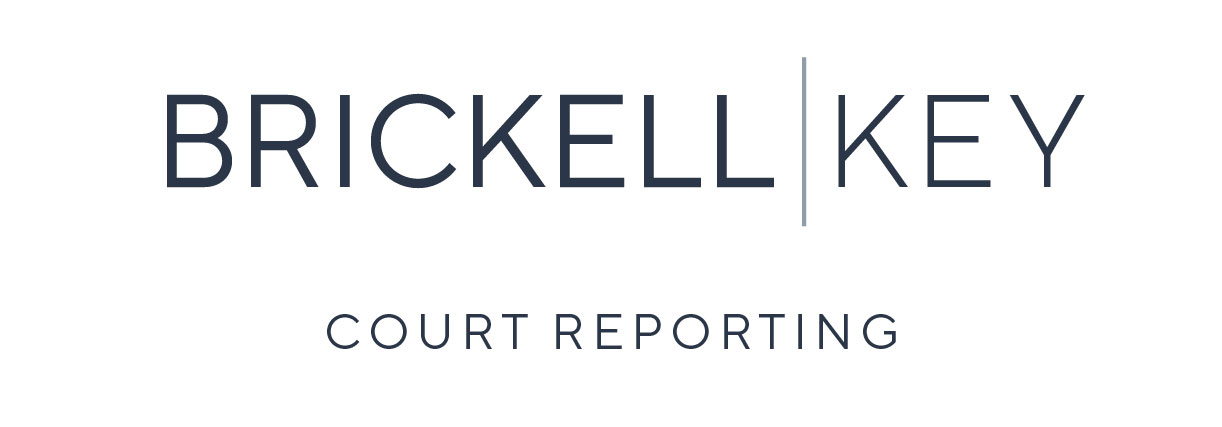Please contact us at Brickell Key Court Reporting by e-mail or call (305) 407-9993 to inquire about potential employment opportunities.
Perhaps you’re involved in one of the cases currently held up because of a lack of court reporters? It can be frustrating waiting for legal proceedings, which is why several courts, including Miami, are looking at options. Moreover, the pandemic forced everyone to stay at home so suddenly a remote court reporter job is a very real thing that looks as if it’s going to stay.
Shortage of Court Reporters
With an 18% decrease in court reporters since 2018, according to the Nationwide Academy for Court Reporting, it’s not surprising that courts are worried about their backlog. This is also creating havoc due to last minute cancellations for hearings including divorce and criminal pleas. Getting a divorce is stressful enough without rescheduled hearings.
So, why are we getting a shortage of local and remote court reporter professionals:
- Obscure industry leads to lower enrolment
- Fears of technology taking over
- Learning shorthand takes time
Obscure industry leads to lower enrolment
It’s probably not the first industry that comes to mind as you graduate from university. Unfortunately, it tends to be hidden in the shadows perhaps even with some stigma about being old-fashioned. After all, the image of a stenographer in a courtroom almost feels like it belongs to something back in time.
This is absolutely not the case though and a remote court reporter job gets a great salary along with flexibility around their work. Moreover, they get to sit in on some fascinating cases that are all different every day. With so much shortage, freelancers can also dictate exactly what they want to work on and from where.
All this is helping the Miami courts to rebrand their remote court reporter jobs to show them as the exciting opportunities that they are. Wouldn’t you want to be well paid while experiencing variety and autonomy?
Fears of technology taking over
The growth of digital technology always makes people uncomfortable. Of course it isn’t easy to learn new tools or to change our working habits. Although, as the Miami courts have shown, the technology isn’t enough and they still need a human to verify details. In fact, it’s the blend of technology and human skill that makes a remote court reporter so good at what they do.
Learning shorthand takes time
Any new skill takes practice no matter how quickly you learn it. Some courses advertise that you can learn shorthand in hours or days. Nevertheless, you need to practice to reach the speed and accuracy required to be a successful remote court reporter.
Let’s not forget though that it’s not just court proceedings that require shorthand but also many journalist and even sports reporter jobs. When you’re out in the field, you can’t always bring your equipment with you. Furthermore, very senior secretaries often need it to support their CEOs with meetings. So, depending on what you want to do with your career, it can be worth the effort and time invested.
Miami Remote Court Reporter Technology
Clearly, digital technology is a big part of our world. Now, Miami courts have been using this to their advantage due to the remote court reporter shortages.
- Cloud Computing
- Audio and video
- Internet streaming
- Real-time transcription
Cloud Computing
As most of us know, it’s very useful to back up all your documents and photos into the cloud. A remote court reporter also uses this to back up their transcripts, media files, and notes.
Another advantage is that anyone with the code can access them whenever they need to safely and securely. Many court proceedings rely on speed and the different legal parties will use these notes overnight to amend their statements as required.
Audio and video
Courthouses have actually been using various digital tools for years. One that’s now relatively common is the voice writing equipment. Instead of using a stenographer, a remote reporter speaks into a stenomask to capture the exact proceeding. The equipment then uses audio-to-text technology to transcribe everything.
Another useful technology is. video-to-text. This allows the lawyers to create dynamic statements where they can playback certain sections of the hearing to the jury. The video is also synchronized with the remote court reporter’s transcript for complete accuracy.
Internet streaming
The pandemic normalized streaming for any remote court reporter to complete their transcript. An added advantage is that other key people for the hearing can join remotely. This is likely to stay post-pandemic because it cuts out travel that reduces cost and waiting times for hearings.
Text streaming is also an alternative. In that case, people don’t get to see the hearing in real-time. Instead, they get a stream of instant, real-time texts from the remote court reporter of what’s being said in court. Furthermore, anyone can easily access the stream over LAN or WiFi, without an internet connection.
Real-time transcription
As you can imagine, a remote court reporter needs to do everything in real-time, thanks to the technology. This then gives flexibility about how the transcript can be viewed. Some courts use a dedicated cloud repository, others send out e-transcripts and texts.
Overall, this increases speed and costs. Moreover, a remote court reporter now has more flexibility about how they work and in what kind of environment. Clearly, it’s critical for them to have secure and encrypted equipment as demanded by the courthouses and general court reporting best practices.
The Future of Remote Court Reporter Jobs
The good news is that remote court reporter jobs aren’t going anywhere. There’s still an expected 9% in demand for jobs between now and 2029, according to the US Bureau of Labor Statistics.
So, what can we expect moving forward?
- Blended technologies
- Independent freelancers
- Secure platforms
- Multi-task across various fields
- Standards and best practice
Blended technologies
Digital court reporting is actually not new but it has received media attention since the pandemic and the shortage of remote court reporter professionals. Nevertheless, the shortages within the industry have been around for some time and courthouses started adopting digital technology around 25 years ago.
Just like stenographers co-existed with typewriters, so a remote court reporter can partner with digital tools. Much as Artificial Intelligence is promoted as being almost as good as humans, courthouses can’t risk not having a real person in their process. That’s a remote court reporter who knows how to leverage the technology to be that much more accurate and effective will always be in demand.
Independent freelancers
The pandemic already increased the number of independent contractors within the industry. Now, there’s no such thing as going back to a norm once something as extreme as a pandemic has changed people’s working habits.
People trying to get back into offices and in-person working forget that it takes months to form new habits. We’ve now been remote working in many industries, including the legal one, for two years. It would take an equally monumental event to get us back to our old ways of working.
Moreover, a remote court reporter is often required to get the transcripts checked overnight. It’s only natural that people only put in the extra hours from home where they can easily go to bed without a long commute first.
Secure platforms
Some obviously question how safe and reliable any digital solution is. Naturally, nothing is ever 100%, including physical files in offices that can get broken into. Furthermore, as mentioned, the systems have been tested for years, much longer than since the pandemic,
Multi-task across various fields
Despite the numerous job opportunities for a remote court reporter, some might like to diversify. This is a great way to up-skill across industries while also keeping variety in your day-to-day-. There are many options including writing subtitles for films, transcribing news, sports and even helping those with hearing loss.
Standards and best practice
The American Association of Electronic Reporters and Transcribers (AAERT) sets the guidelines for best practice and all industry standards. They also offer training, education and ongoing professional development.
Before entering the industry, a remote court reporter must have a 2 to 4 year degree. They can then enter a court reporting program before passing the exams to get their license. As part of that process, they’ll also learn stenography and how to use the digital tools available to them.
What’s Next for Remote Court Reporter Professionals?
If you want to be part of an industry where you’ll be in demand and able to manage your own work and hours then perhaps you could be a remote court reporter. For those working in courthouses or involved in hearings either now or in the future, rest assured that the industry is changing. By leveraging digital technology, courthouses are covering the shortages and ensuring an effective, top-of-the-range process.
Please contact us at Brickell Key Court Reporting by e-mail or call (305) 407-9993 to inquire about potential employment opportunities.



